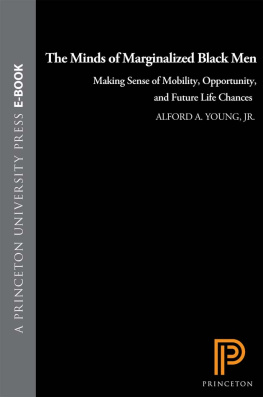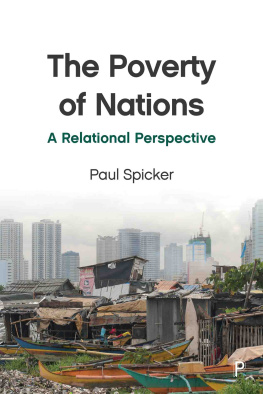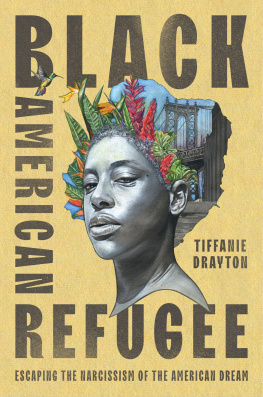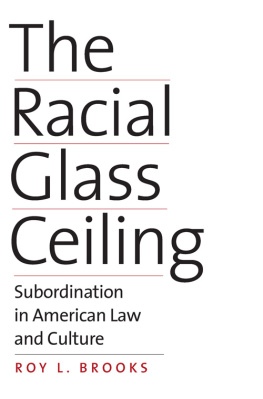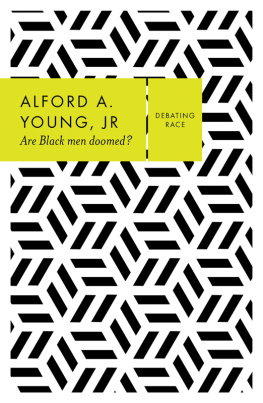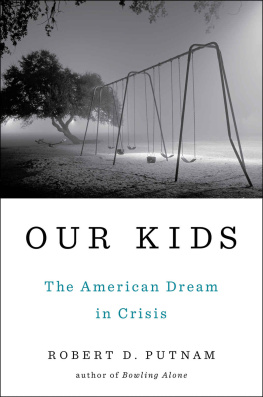Copyright2004 by Princeton University Press
Published by Princeton University Press, 41 William Street,
Princeton, New Jersey 08540
In the United Kingdom: Princeton University Press,
3 Market Place, Woodstock, Oxfordshire OX20 1SY
All Rights Reserved
Second printing, and first paperback printing, 2006
Paperback ISBN-13: 978-0-691-12700-2
Paperback ISBN-10: 0-691-12700-X
The Library of Congress has cataloged the cloth edition of this book as follows
Young, Alford A., Jr.
The minds of marginalized Black men : making sense of mobility,
opportunity, and future life chances / Alford A. Young, Jr.
p. cm.(Princeton studies in cultural sociology)
Includes bibliographical references and index.
ISBN 0-691-09242-7 (cloth : alk. paper)
1. Poor menIllinoisChicagoAttitudesCase studies. 2. African
American menIllinoisChicagoAttitudesCase studies.
3. Social mobilityUnited StatesPublic opinion. 4. Equality
United StatesPublic opinion. 5. Social stratificationUnited
StatesPublic opinion. 6. United StatesRace relationsPublic
opinion. 7. Social perceptionIllinoisChicagoCase studies.
I. Title. II. Series.
HV4046.C36.Y68 2003
305.38'896073'077311dc21 2003041862
British Cataloging-in-Publication Data is available
This book has been composed in Sabon
Printed on acid-free paper.
pup.princeton.edu
Printed in the United States of America
10 9 8 7 6 5 4 3 2
THIS BOOK IS DEDICATED TO THE MEMORY OF
Alford A. Young, Sr.
A CHAMPION OF A MAN
Acknowledgments
First, I thank the men who shared their stories, opinions, and points of views with me so that I could write this book. They willingly and courageously let me step into their lives and let me listen to them express their hopes and dreams, their tragedies and failures. I fully believe that they deserve a better day, and hope that this work, in some small way, might lead to making that possible.
My first serious consideration of African American men as a population in crisis began after I was accepted into the membership of the Archbishops Leadership Project, a program of the Roman Catholic archdiocese of New York that aimed to cultivate and enhance the leadership skills of African American male youth (it has since become a coeducational program). I thank the founder and initial director of the project, Father John T. Meehan, for providing me with the arena for beginning to think about this issue. I also thank the alumni of the project, who inspired, educated, and supported me as I gradually entered into academia in a sincere quest to address and (in whatever ways possible) redress the plight of African Americans.
My decision to become a scholar, and my eternal rethinking about what it means to function responsibly as one, is due in more ways than I can count to Jerry Watts. If the people involved in the Leadership Project are central to what I think about in terms of social uplift, then Jerry is central to how I think about it. In the past twenty years, when I was not in conversation with these people about the plight of African Americans or the means for their social uplift, then I often was with Fred Wallace. Rest in peace, Mr. Wallace, and know that at least one other person out there is trying to follow your example.
In the course of constructing the research that went into this book, I benefited from, and thus thank immensely, William Julius Wilson. He gave me support, resources, guidance, enthusiasm, and many of the concepts that became core emphases in this project. Others who nurtured me as a young researcher trying to make some sense about social inequality include Edgar G. Epps, Moishe Postone, George Steinmetz, Richard Taub, Thomas Holt, and Michael Dawson. I am fortunate to have benefited from this collection of brilliant minds.
Early in the course of turning this project into a book I was approached by Michle Lamont, who determined to offer me the kind of guidance and support that scholars usually reserve for their students. She read every word of multiple drafts of this work. That is more than an author should ask of anyone and, it turned out, really the least that she has given to me throughout the time that it took for me to pull this off. Charles Lemert served as a masterful mixture of constructive critic and supreme cheerleader for this work. In his own unique way, he encouraged me to realize the promise of this work, and this carried me through each chapter.
Howard Winant, Ann Arnett Ferguson, Roseanne Anderly, Howard Kimeldorf, Mark Chesler, Andy Modigliani, Rick Lempert, Karin Martin, Barbara Laslett, Amanda Lewis, Geoff Ward, Mario Small, and Nasha Vida read parts of this work and said many things, big and small, to help it turn out as it has. The faculty of the School of Social Science at Hampshire College, the Great Barrington Theory Circle, and the members of the Race and Racial Ideologies Workshop and the School and Schooling Workshop at the University of Chicago provided helpful criticisms and assessments over the years. The same holds for audiences at Northwestern University, the University of Richmond, and Columbia University.
Ian Malcolm, acquisitions editor, and Mark Bellis, production editor, at Princeton University Press, guided meand more importantly, kept me at easethrough the publication process. The editing done by Kristin Gager and Jodi Beder has made this material much more comprehensible. Their efforts allowed me to understand better the need to write not for oneself, but for other people.
Reuben May, Mary Pattillo, Ray Regans, Nick Young, Jolyon Wurr, Sandra Smith, Mignon Moore, Jim Quane, and the people associated with the Center for the Study of Urban Inequality at the University of Chicago challenged me, laughed with me, and kept me aware of the sheer joys and pleasures of doing scholarship. Dan Cook and Sudhir Venkatesh are two people who are brimming with provocative ideas and good spirit. Thanks for sharing both with me.
My colleagues in the Department of Sociology and at the Center for Afroamerican and African Studies at the University of Michigan welcomed me into their communities and helped me to make them my own. They stimulated my thinking from the first day of my arrival in Ann Arbor. James S. Jackson, director of the Center, provided crucial support for the editing and final preparation of the manuscript, and I am grateful for his doing so.
My mother, Anne Young, and my sister, Elizabeth, had little idea of what I was up to with this work, but like excellent family members, they were completely supportive nonetheless. The same holds for my son, Alford III, who somehow was able to practice patience (a rare feat for him) whenever daddy really had to get some work done. Finally, one family membermy wife, Carla OConnorknew all along exactly what I was up to, and because she did, she determined to step into this work with me (editing and evaluating it) while knowing how to keep the rest of the world out of it when I needed that to happen. She has sacrificed her time and energy to help me get it done. If there ever was an example of how much one individual could help another to get through a challenge, then she is it. Love you, sweetie.

